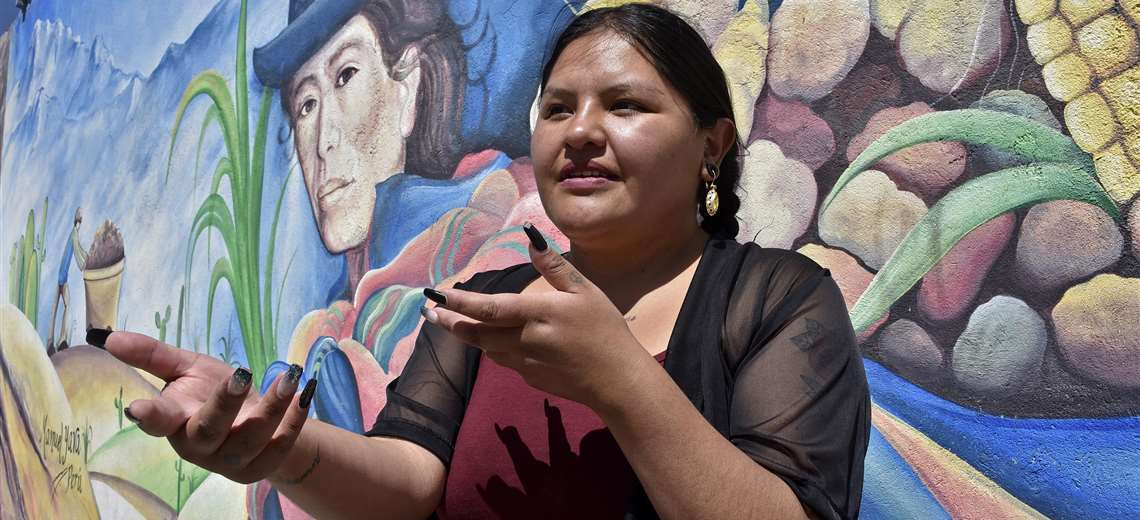Bolivian Alwa, the first Aymara rapper, waves her arms to accompany her melodies, incorporating traditional Andean instruments such as the panpipe and the charango.
Small in stature, she wears the typical Aymara skirt with several bell-like folds and a bowler hat over her black braids, clothing with which she offers what she calls “rebellious music.”
Weeks after his stage debut, Alwa (“Sunrise” in the Aymara language) has just given his second concert, at a book fair in the atrium of the main state university in La Paz.
She is the first indigenous woman to emerge in this little-known musical genre in Aymara society, where melancholic rhythms prevail accompanied by drums, panpipes, flutes and charangos.
But the 26-year-old, born in the city of El Alto, neighboring La Paz, has already produced her first music video: “Principio sin fin.” A first album should come out in the middle of the year with the support of some businessmen from Santa Cruz, she says.
“I don’t care if people get upset over my music / Just tell my mom that fear won’t stop me / She won’t be able to beat me / Also tell her that I’ll make a living from rap/”says in the first verses of the song, which starts with panpipes, the typical Andean wind instrument, accompanied by charangos.
She adds: “Today I introduce myself / I am the Alwa, a proud Aymara woman / Proud to be Bolivian / Today I am not going to stop, I am not going to rest, until I achieve my dreams.”
“In my lyrics I express my feelings about things, my opinion of the situation we are living in now, we have all suffered injustice,” Alwa, who prefers not to give his full name, tells AFP.
“I think that rap starts from that, from feeling that rebellion, from rebelling against something that is not agreed upon, but it has to be something logical.”
“My dream is to sing”
Born into a traditional family and with no musicians – let alone rappers – around her, she is currently studying advertising and marketing at university, but says that her dream since she was little was to sing.
“My dream has been to sing, since I was little I liked to sing.”
Then he linked up with “urban tribes”, where he began to permeate rap, this genre that became popular in the poor neighborhoods of the United States, until it spread to other regions of the world.
She is an admirer of the rappers “Warrior” from Peru and “Alika” from Argentina and to a lesser extent the Puerto Rican Residente.
Like everyone in her family, her mother “doesn’t like” rap and her father wants her to pursue a college career, but she has other ideas.
“What I really want now is to make music.”
A star Is Born
For her second free concert, Alwa met in the atrium of the main state university UMSA in La Paz, invited by a private association of book sellers.
On a cold night, the Aymara rapper makes her song “Principio sin fin” resonate. She also performs four other songs that she hopes to incorporate on her first album.
Fifty casual spectators watch her rap. They raise their hands, clap and whistle, enraptured.
“She’s super, I think she’s a spectacular artist, in her way of being, in her clothes,” says Jesús Choque, a 23-year-old student, who listens to her for the first time.
Beside her, Carlos Jonás Sirpa highlights: “It’s the first time I’ve seen a woman in a skirt sing on a stage, raise the Bolivian name, it’s great, it’s something very beautiful.”
After more than half an hour, Alwa ends her concert. “I am very content and happy,” she says with a smile.
His fame begins to grow. On the street, some people recognize her and stop in her path to take a photo.
One of them is Kevin Coronel, 22 years old. “She is great, I heard her for the first time in Chile, I thought she was Peruvian and it turns out that she is Bolivian, I saw her on Tik Tok and she is great.”
But she still thinks she has a way to go.
“I’m in the process of being a rapper, I’m not yet.”
Bolivian Alwa, the first Aymara rapper, waves her arms to accompany her melodies, incorporating traditional Andean instruments such as the panpipe and the charango.
Small in stature, she wears the typical Aymara skirt with several bell-like folds and a bowler hat over her black braids, clothing with which she offers what she calls “rebellious music.”
Weeks after his stage debut, Alwa (“Sunrise” in the Aymara language) has just given his second concert, at a book fair in the atrium of the main state university in La Paz.
She is the first indigenous woman to emerge in this little-known musical genre in Aymara society, where melancholic rhythms prevail accompanied by drums, panpipes, flutes and charangos.
But the 26-year-old, born in the city of El Alto, neighboring La Paz, has already produced her first music video: “Principio sin fin.” A first album should come out in the middle of the year with the support of some businessmen from Santa Cruz, she says.
“I don’t care if people get upset over my music / Just tell my mom that fear won’t stop me / She won’t be able to beat me / Also tell her that I’ll make a living from rap/”says in the first verses of the song, which starts with panpipes, the typical Andean wind instrument, accompanied by charangos.
She adds: “Today I introduce myself / I am the Alwa, a proud Aymara woman / Proud to be Bolivian / Today I am not going to stop, I am not going to rest, until I achieve my dreams.”
“In my lyrics I express my feelings about things, my opinion of the situation we are living in now, we have all suffered injustice,” Alwa, who prefers not to give his full name, tells AFP.
“I think that rap starts from that, from feeling that rebellion, from rebelling against something that is not agreed upon, but it has to be something logical.”
“My dream is to sing”
Born into a traditional family and with no musicians – let alone rappers – around her, she is currently studying advertising and marketing at university, but says that her dream since she was little was to sing.
“My dream has been to sing, since I was little I liked to sing.”
Then he linked up with “urban tribes”, where he began to permeate rap, this genre that became popular in the poor neighborhoods of the United States, until it spread to other regions of the world.
She is an admirer of the rappers “Warrior” from Peru and “Alika” from Argentina and to a lesser extent the Puerto Rican Residente.
Like everyone in her family, her mother “doesn’t like” rap and her father wants her to pursue a college career, but she has other ideas.
“What I really want now is to make music.”
A star Is Born
For her second free concert, Alwa met in the atrium of the main state university UMSA in La Paz, invited by a private association of book sellers.
On a cold night, the Aymara rapper makes her song “Principio sin fin” resonate. She also performs four other songs that she hopes to incorporate on her first album.
Fifty casual spectators watch her rap. They raise their hands, clap and whistle, enraptured.
“She’s super, I think she’s a spectacular artist, in her way of being, in her clothes,” says Jesús Choque, a 23-year-old student, who listens to her for the first time.
Beside her, Carlos Jonás Sirpa highlights: “It’s the first time I’ve seen a woman in a skirt sing on a stage, raise the Bolivian name, it’s great, it’s something very beautiful.”
After more than half an hour, Alwa ends her concert. “I am very content and happy,” she says with a smile.
His fame begins to grow. On the street, some people recognize her and stop in her path to take a photo.
One of them is Kevin Coronel, 22 years old. “She is great, I heard her for the first time in Chile, I thought she was Peruvian and it turns out that she is Bolivian, I saw her on Tik Tok and she is great.”
But she still thinks she has a way to go.
“I’m in the process of being a rapper, I’m not yet.”
;


















